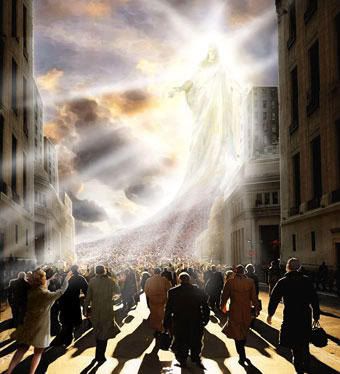dadof10
Member
- Nov 5, 2006
- 2,718
- 0
wavy said:The 'complexity' of the universe is non-issue. There's no cosmic scale with which to gauge how 'complex' the universe is. We have only our minds, and it is our very limited understanding of the universe that makes it seem 'complex' to us.
I was not making a comparative statement, I was using the word "complex" to describe the millions (billions?) of random events that must have happened to get where we are now.
I notice you didn't answer the question
 Which seems more reasonable, intelligent design or randomness? Is there a third option?
Which seems more reasonable, intelligent design or randomness? Is there a third option?Ironically, one example is the kalam cosmological argument...which a theistic argument.
Namely:
1) Whatever beings to exist has a cause
2) The universe began to exist
3) Therefore the universe has a cause
One of the supports of the KCA that philosophers like Bill Craig utilize is the 'impossibility' of an actual infinite. Namely, the universe cannot have existed for infinity past, since traversing an actual infinity of time cannot be accomplished. The universe must have had a beginning of its existence, so it must have a cause, as premise 1 argues. This means God cannot be infinite for the same reason the universe cannot be infinite. Time began at the big bang singularity, so nothing can come 'before' it, since this is incoherent.
I'm not altogether sure of the nuances of Craig's KCA, but since Craig is a deist this seems like a reasonable take:
A common objection at this point is that if an actual infinite cannot exist, and God is infinite, then God cannot exist. This objection is based on a confusion of the terms "infinite" and "actual infinite." An actual infinite is a technical concept found in set theory that refers to sets and collections, not to single beings. To deny that an actual infinite can exist is to deny that a library with an actually infinite set of books or a museum with an actually infinite number of paintings can exist. God, on the other hand, is a being, not a set or collection of things, and hence God is not an actual infinite. It should be noted that kalam defenders do not dispute the legitimacy of the actual infinite as a mathematical concept. Craig writes that what kalam defenders argue "is that an actual infinite cannot exist in the real world of stars and planets and rocks and men" (Craig, The Existence of God, 42). In fact, until Gregor Cantor's work in set theory, mathematicians rejected the existence of an actual infinite as a mathematical concept. But Cantor himself denied the existential possibility of the actual infinite. In correspondence with the Pope, he even suggested that the existential impossibility of the actual infinite could be used in a mathematical-metaphysical proof for the existence of God.
http://ourworld.compuserve.com/homepages/billramey/whomade.htm
I'm not sure if when Craig says "is that an actual infinite cannot exist in the real world of stars and planets and rocks and men", he is ruling out things outside of time, which would seem to make sense. I'll have to do some more research.
This creates a problem for advocates of the KCA, so they argue for 'simultaneous causation' of the universe by God. Namely, that he is not temporally prior to the universe...he is atemporally or ontically prior to the universe as a timeless being. Then he became temporal at the beginning of the universe.
Despite a number of sophisticated arguments used to support this view, it ultimately, imo, is flawed by contradiction. By definition, a timeless being cannot change. Anything stated about a timeless entity is, by definition, timelessly true. God can never be timeless and become temporal, since this involves a changed state of affairs, all of which are temporal relations.
I agree with you on this. I don't think God changed in any way. A Being outside of time can't change.
If the universe had a beginning, God had a beginning. We're left with a situation where the alleged causal and effectual positions of God and the beginning of the universe exist simultaneously meaning there was never a god without the universe, and therefore no way for God to bring the universe from 'potentiality' to 'actuality'. So God cannot exist.
A lot of words to ask "If everything must have a cause, what caused God?"
 I think the key is mentioned above, that God is outside of time and that would remove Him from the "actual infinite" argument, if Craig means that the impossibility of the actual infinite only applies to things within time. But, as I said, I need to research it more.
I think the key is mentioned above, that God is outside of time and that would remove Him from the "actual infinite" argument, if Craig means that the impossibility of the actual infinite only applies to things within time. But, as I said, I need to research it more.





 What was I thinking...Theist, not deist...Sheesh
What was I thinking...Theist, not deist...Sheesh

